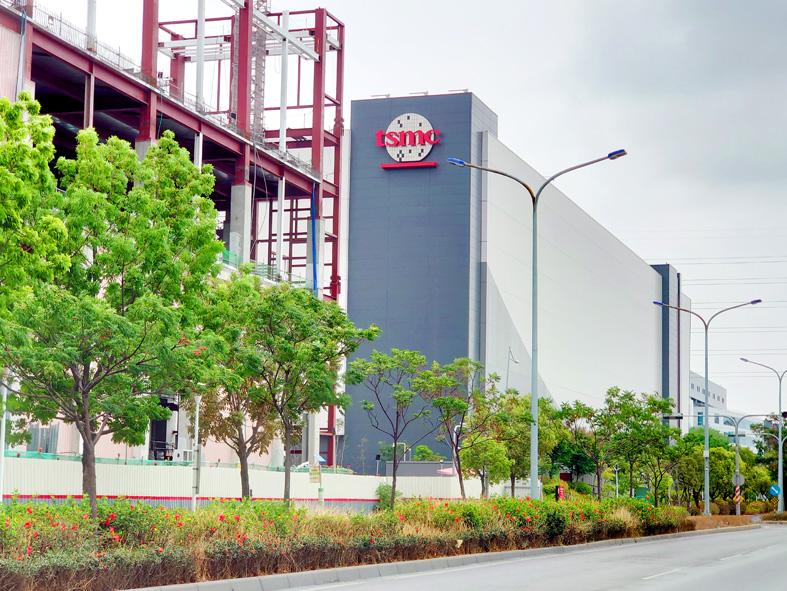Taiwan Semiconductor Manufacturing Co’s (TSMC, 台積電) shipments would not be affected by the contamination of gas used in the manufacturing process at one of its key plants in Tainan, the firm said yesterday.
While some TSMC production lines in Tainan’s Southern Taiwan Science Park received gas supplies that were found to be substandard, the chipmaker continued production using gas from other sources, the company said.
Local media reported that the contamination was discovered at the world’s largest contract chipmaker’s Fab 18 on Thursday night and that production would be affected during four days of cleanup work.

Photo: Hung Rui-ching, Taipei Times
While not confirming that the contamination occurred at the facility, TSMC said that based on an internal assessment, no delays in chip delivery would result from the incident.
Stringent follow-up measures have been implemented to monitor and trace the contamination, TSMC said, adding that this would not significantly affect operations at the site.
Moreover, torrential rains that yesterday caused flooding in Shanhua District (善化) did not affect operation at the nearby Fab 18 or at other facilities at the Southern Taiwan Science Park, the park operator said.
Local media reported 380mm of rainfall within 24 hours at the park, and flooding at parking lots and administrative buildings.
Fab 18 makes chips on TSMC’s 5-nanometer process, its latest technology, which went into mass production in the second quarter.
The plant produces A15 processors for Apple Inc’s new line of iPhones, which are scheduled to be released next month.
TSMC is reportedly the sole supplier of processors for the new iPhones, and a chip delivery delay might affect the line’s release.
Fab 18 reportedly also produces M1X and M2 processors for Apple’s latest MacBook Pro models.
Meanwhile, with the approach of the peak season for the global semiconductor industry, any incidents impeding production at TSMC plants might compromise the chipmaker’s third quarter sales, analysts said.
TSMC is developing 2- and 3-nanometer processes, with the latter to start production in the second half of next year.

SELL-OFF: Investors expect tariff-driven volatility as the local boarse reopens today, while analysts say government support and solid fundamentals would steady sentiment Local investors are bracing for a sharp market downturn today as the nation’s financial markets resume trading following a two-day closure for national holidays before the weekend, with sentiment rattled by US President Donald Trump’s sweeping tariff announcement. Trump’s unveiling of new “reciprocal tariffs” on Wednesday triggered a sell-off in global markets, with the FTSE Taiwan Index Futures — a benchmark for Taiwanese equities traded in Singapore — tumbling 9.2 percent over the past two sessions. Meanwhile, the American depositary receipts (ADRs) of Taiwan Semiconductor Manufacturing Co (TSMC, 台積電), the most heavily weighted stock on the TAIEX, plunged 13.8 percent in

A wave of stop-loss selling and panic selling hit Taiwan's stock market at its opening today, with the weighted index plunging 2,086 points — a drop of more than 9.7 percent — marking the largest intraday point and percentage loss on record. The index bottomed out at 19,212.02, while futures were locked limit-down, with more than 1,000 stocks hitting their daily drop limit. Three heavyweight stocks — Taiwan Semiconductor Manufacturing Co (TSMC, 台積電), Hon Hai Precision Industry Co (Foxconn, 鴻海精密) and MediaTek (聯發科) — hit their limit-down prices as soon as the market opened, falling to NT$848 (US$25.54), NT$138.5 and NT$1,295 respectively. TSMC's

TARIFFS: The global ‘panic atmosphere remains strong,’ and foreign investors have continued to sell their holdings since the start of the year, the Ministry of Finance said The government yesterday authorized the activation of its NT$500 billion (US$15.15 billion) National Stabilization Fund (NSF) to prop up the local stock market after two days of sharp falls in reaction to US President Donald Trump’s new import tariffs. The Ministry of Finance said in a statement after the market close that the steering committee of the fund had been given the go-ahead to intervene in the market to bolster Taiwanese shares in a time of crisis. The fund has been authorized to use its assets “to carry out market stabilization tasks as appropriate to maintain the stability of Taiwan’s

STEEP DECLINE: Yesterday’s drop was the third-steepest in its history, the steepest being Monday’s drop in the wake of the tariff announcement on Wednesday last week Taiwanese stocks continued their heavy sell-off yesterday, as concerns over US tariffs and unwinding of leveraged bets weighed on the market. The benchmark TAIEX plunged 1,068.19 points, or 5.79 percent, to 17,391.76, notching the biggest drop among Asian peers as it hit a 15-month low. The decline came even after the government on late Tuesday authorized the NT$500 billion (US$15.2 billion) National Stabilization Fund (國安基金) to step in to buoy the market amid investors’ worries over tariffs imposed by US President Donald Trump. Yesterday’s decline was the third-steepest in its history, trailing only the declines of 2,065.87 points on Monday and